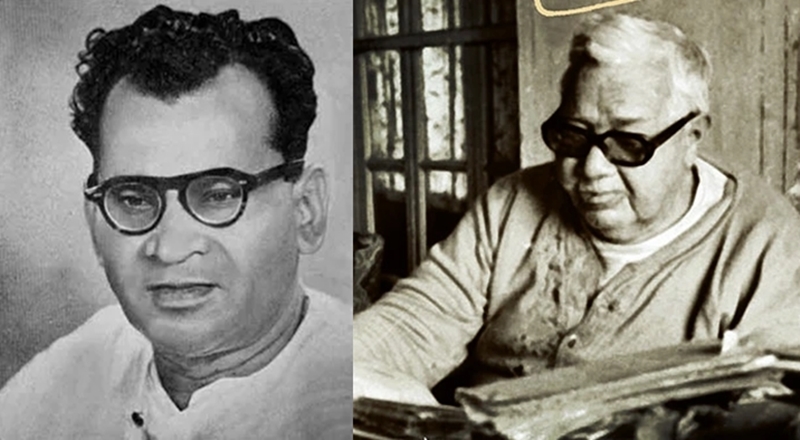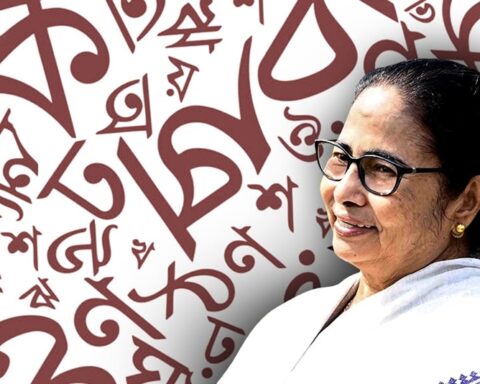Kolkata, Oct 6 Academics and Bengali identity advocacy groups have hailed the decision of the Centre to accord classical language status to Bengali language expressing hope that it will facilitate in greater use of the language in official communication and examinations.
Eminent indologist and linguist Nrisingo Prasad Bhaduri said he hoped that after the honour, at all India level, there will be greater use of the language in competitive examinations, more use of synonyms of familiar English terms in science and economics and present day students will feel encouraged to use these Bengali synonyms in their exams.
Thanking West Bengal Chief Minister Mamata Banerjee, Bhaduri said after he and other academics drew her attention to the fact that Bengali was not accorded classical language status despite having thousands of years of history from the day of its origin and evolution. “The state government submitted voluminous documents in this regard very promptly and the recognition came in 6-7 months period,” he told PTI.
“Bengali language has an ancient past having originated such a long time back and it is ironical that a language in which Rabindranath Tagore wrote his poems, songs, short stories and novels and penned his articles did not get its due recognition earlier,” he said.
Bhaduri said they drew the attention of Banerjee about Bengali not getting recognition as a classical language during the International Language Day on February 21 at a function and the CM promised to immediately follow up on the issue.
The general secretary of Bangla Pokkho, the outfit advocating the identity of Bengalis and promoting their language and culture, Garga Chatterjee said “We are happy with the recognition but this was long overdue.” “While the entire world was aware of the preeminence of Bengali language, only the Centre seemed to be unaware of it in all these days,” he said.
Chatterjee thanked CM Banerjee, senior Congress leader and former MP Adhir Chowdhury for highlighting the demand at the national level.
“However our fight will be fruitful when the use of Bengali language at all India level will be institutionalized. Already we have secured the right to conduct tests for recruitment in central forces in Bengali. As per the eighth schedule, every language should have same equal rights. We now look forward to effective implementation of that,” he added.
Expressing hope the Centre will show the real intent to give Bengali the due recognition in the coming days, he said “Otherwise we will launch a fierce movement in coming days.” Expert Amitava Das, one of the researchers from the ‘Institute of Language Studies’, said the criteria for the honour is to prove a language is 1500-2000 years and their researchers had been at work on this for years. The state education department had entrusted ILS with the work.
Anjana Bhadra, a senior professor at K K Das College in the city expressed hope after this honour there will be a centre for excellence at the initiative of the centre to continue research and studies in Bengali language.
“We hope the recognition will pave the way for setting up chairs, pursuing research in Bengali language and institute awards for researchers and scholars in the coming days,” Bhadra said.
West Bengal Chief Minister Mamata Banerjee earlier expressed happiness over the Centre according classical language status to Bengali and said her government had been actively working over the past few years in submitting documents to back the claim.
Bengali, Assamese, Marathi, Pali and Prakrit were declared classical languages on October 3 by the Union Cabinet during a meeting chaired by Prime Minister Narendra Modi.
Immediately after the Centre’s announcement on Thursday, the CM had posted on her X handle, “Most happy to share that Bengali/Bangla has been finally accorded the status of a classical language by Government of India. We had been trying to snatch this recognition from Ministry of Culture, GOI and we had submitted three volumes of research findings in favour of our contention.” “The Union government has accepted our well-researched claim and we finally reach the cultural apex in the body of languages in India,” she said.
Classical languages serve as a custodian of Bharat’s profound and ancient cultural heritage, embodying the essence of each community’s historical and cultural milestone, the central government said.
In a statement, the Centre said the inclusion of Marathi, Pali, Prakrit, Assamese and Bengali in the classical language category will create significant employment opportunities, particularly in academic and research fields.
Additionally, the preservation, documentation and digitisation of ancient texts of these languages will generate jobs in archiving, translation, publishing and digital media, the government said.
On October 12, 2004, the Government of India decided to create a new category of languages as “classical languages”, declared Tamil a classical language and set criteria for the status.
State higher education minister Bratya Basu posted on X: “Bangla has finally received the recognition it deserves. Thanks to CM Mamata Banerjee who advocated directly to PM Narendra Modi, Bangla now stands proudly as a Classical Language. This victory is for every Bengali, for our heritage and the cultural identity we hold so dear.”
In 2023, the state higher education department established the Institute of Language Studies and Research (ILSR) to advance knowledge in language studies, translation and cultural research. The institute gathered evidence and prepared a draft that was submitted to Centre, seeking classical recognition for Bengali.
Speaking on the honour, Trinamool Rajya Sabha leader Derek O’Brien said, “Vanga-Bhasa was the language spoken by the inhabitants of the ancient Janapada of Vanga Desa, in the eastern region of the Indian subcontinent. The term ‘Vanga’ first appears in the Aitareyya Brahmana.”
He also cited the work of distinguished linguists Suniti Kumar Chattopadhyay and Sukumar Sen, who traced the origin of Bengali to the 6th-century Magadhi Apabhramsha and noted that the language acquired its distinct form in the 10th century.
O’Brien further highlighted the significance of the Buddhist text ‘Charyapada’, written between the 8th and 12th centuries, which marked the beginning of Bengali literature. He also mentioned archaeological findings and inscriptions in Pali, Sanskrit and Chinese, indicating the existence of Bengali as a language even in the 3rd-4th century BCE.
ILSR conducted extensive research for nearly two years to gather supporting documents and material for the recognition of Bengali as a classical language.
The research team comprised experts from various fields, and the CM submitted the research findings to Centre on Jan 12. According to the ministry of culture, the criteria for declaring a classical language include high antiquity of its early texts/recorded history over a period of 1,500-2,000 years, a body of ancient literature/texts considered a valuable heritage, an original literary tradition not borrowed from another speech community, and a distinction between the classical language and its later forms or offshoots.
Selim Box Mandal, an external expert of the institute, said: “We had compiled early texts and recorded history of Bengali language starting from Charyapada from 8th century. We have prepared three volumes that include several pieces of evidence.
West Bengal Chief Minister Mamata Banerjee on January 14, 2024 wrote to Prime Minister Narendra Modi, urging him to give Bengali the status of a classical language as it has ‘qualified’ the criteria set by the Centre. In her letter to the PM, Banerjee presented a research document that claimed to fulfil all the four criteria set by the Ministry of Home Affairs. Mamata’s letter to PM
This was not the first time that Mamata Banerjee has supported Bengali as a classical language. Earlier in 2020, Mamata urged the Centre to give Bengali the status of a classical language
Inputs with PTI



